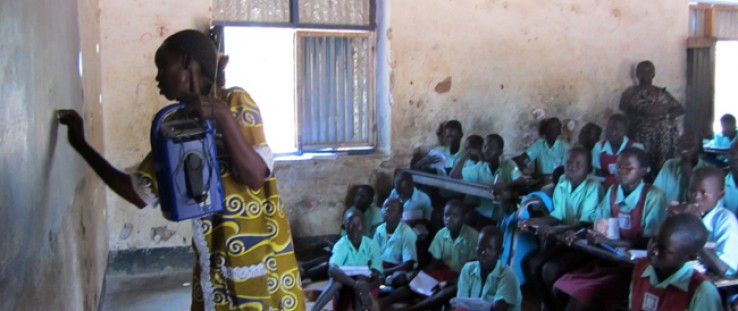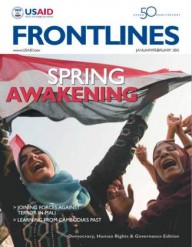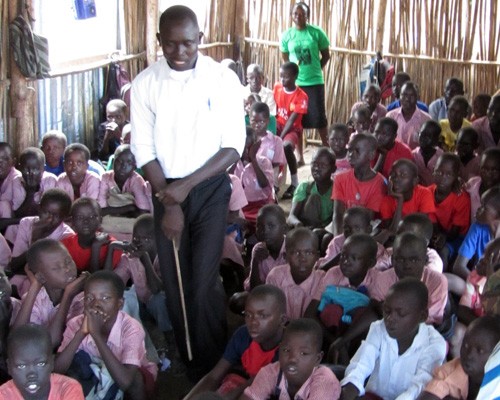 A teacher at Torit East Primary School in Torit, Eastern Equatoria state, South Sudan, holds a solar-powered, wind-up radio as she gives her students a lesson using South Sudan Interactive Radio Instruction.
Stuart Leigh, Real World Productions
A teacher at Torit East Primary School in Torit, Eastern Equatoria state, South Sudan, holds a solar-powered, wind-up radio as she gives her students a lesson using South Sudan Interactive Radio Instruction.
Stuart Leigh, Real World Productions
 A teacher at Torit East Primary School in Torit, Eastern Equatoria state, South Sudan, holds a solar-powered, wind-up radio as she gives her students a lesson using South Sudan Interactive Radio Instruction.
Stuart Leigh, Real World Productions
A teacher at Torit East Primary School in Torit, Eastern Equatoria state, South Sudan, holds a solar-powered, wind-up radio as she gives her students a lesson using South Sudan Interactive Radio Instruction.
Stuart Leigh, Real World Productions
For decades, radio waves have been the primary vehicle to disseminate information in Sudan, as in many places where literacy is low, electricity is inconsistent or uneven, and media options are few. But until eight years ago, most people in South Sudan did not have access to radio or any type of independent media.
In 2003, when Sudan was still embroiled in civil war, Sudan Radio Service, the country’s first independent broadcaster of news and information, was launched with USAID assistance. In the early days, broadcasts took place on shortwave from Nairobi for just one hour per day.
Since then, the Agency's support for the platform has helped educate and inform millions of people. In addition to Sudan Radio Service, USAID also supported the establishment of six community radio stations between 2005 and 2011 in southern Sudan and in northern Sudan’s Blue Nile and Southern Kordofan states. The Agency also supplied over 200,000 solar and crank-powered radios throughout the south and the Three Areas (Blue Nile, Southern Kordofan, and Abyei), increasing access to the broadcasts.
When the 22-year civil war ended with the landmark Comprehensive Peace Agreement (CPA) in 2005, radio was the most efficient and effective way to inform citizens about the agreement and their rights and responsibilities under it. These rights and responsibilities included participating in a nationwide census, voting in nationwide elections in 2010—the first voting opportunity for many Sudanese—and the referendum on self-determination for southern Sudan, which led to the creation of the new nation of the Republic of South Sudan in July 2011.
Radio Rules
In the first public opinion poll conducted in South Sudan, supported by USAID, 61 percent of South Sudanese interviewed said that radio is their primary source of news and information. The next most common source was “word of mouth” (16 percent). The nationwide poll of adults age 18 and over was conducted in September 2011 by Pechter Polls for USAID partner International Republican Institute.
“USAID recognized that it was important to support radio that provided an independent source of reliable information in Sudan, to support the peace process and help mitigate conflicts that could undermine the CPA,” said Donna Kerner, a USAID democracy specialist who helped establish the community radio network in South Sudan in the years before the country’s independence. “Community radio is particularly important in ethnically diverse, multilingual areas that are vulnerable to conflict to provide an accessible community forum for diverse views,” she added. Particularly in remote areas of South Sudan outside the capital of Juba, radio is often the only source of information available. Due to the legacy of war, there is a lack of electricity except in a few major towns, a dearth of print media, exceedingly low rates of Internet access, and high levels of illiteracy. Approximately 73 percent of South Sudanese adults cannot read. Warrap state, for example, which borders the Abyei Area that is disputed by Sudan and South Sudan, has three radio stations—a government-run station in the state capital, Kwajok; a Catholic Radio Network station in Tonj; and Mayardit FM in Turalei, Twic County, run by the NGO Internews and funded by USAID.
“The radio stations are a great source of information for the citizens of Warrap,” said Eric Kessler, a U.S. Government representative based in Warrap state and part of a team helping to build relationships between the U.S. Government and local government officials in South Sudan. “Without the radio stations, people wouldn’t know where to get information on a daily basis.”
Resources for the Displaced
Many displaced persons who fled fighting that erupted in the disputed Abyei Area in May are sheltering in Twic County and need assistance with food, medical care, water, and sanitation. Twic County is also hosting a substantial number of South Sudanese who recently returned from living in Sudan; many of them lived there for decades after fleeing war in the south. They have returned to their areas of origin to resettle and restart their lives, and many need assistance.
“There’s a coordinated effort between the USAID-supported radio station and the NGOs so they can help people identify where resources are and connect lost family members,” Kessler explained. “So it’s a useful resource in a time of crisis.”
USAID funding currently supports three other community FM radio stations run by Internews—in Upper Nile, Unity, and Northern Bahr el Ghazal states—which together with the Twic station broadcast to more than 2 million people, nearly a quarter of South Sudan’s population. The stations broadcast news and information on topics including agriculture, adult literacy, health, hygiene, peace building, and cultural tolerance.
In Juba, Sudan Radio Service—managed by the Boston-based Education Development Center with USAID funding—launched 98.6 SRS FM in December 2010, and currently broadcasts 12 hours per day on FM and 6 hours on shortwave, reaching 1.1 million people. The station has begun generating advertising revenue, which will help make the service sustainable over time. It has also established a partnership with Juba University that offers a certificate in broadcast journalism.
Educational Tool
Radio is not only the most important way to reach the broadest audience in South Sudan with news and information. It is also a critical tool for teaching both young students and adults who have had limited education opportunities, and is helping to build teachers’ skills.
Since 2004, USAID has supported the South Sudan Interactive Radio Instruction project, which provides educational radio programs for primary school classes on topics such as English and math, English language lessons for adults, and programs for teacher training. Since 2004, the broadcasts have reached more than 473,000 primary school students and more than 842,000 South Sudanese with English language radio programming for adults.
The programs reach all of South Sudan’s 10 states through radio broadcasts used in classrooms and other settings, helping to increase the low literacy levels and enlighten South Sudanese on their roles and responsibilities as citizens. As the South Sudan Interactive Radio Instruction Teacher’s Guide to “The Learning Village” program for primary school students states: “Citizens who cannot read and write with ease cannot fully participate in society.”
“In this new nation where English is the official language, but many children and teachers do not speak or understand English well, and there is a lack of instructional materials, South Sudan Interactive Radio Instruction provides a standardized way to give teachers a roadmap for lessons, and to teach students in engaging ways, including with songs and games that help them learn English,” said William Osafo, USAID/South Sudan’s education team leader.
USAID support for radio has helped inform millions of South Sudanese about democracy and their rights and roles as citizens as well as everyday topics such as health and hygiene, and has provided a forum for teaching people of all ages.
USAID’s successful radio programs are a tribute to the dedication of John Granville, a USAID democracy officer who was managing the programs when he and his driver, Abdelrahman Abbas Rahama, were killed by terrorists in Khartoum in the early hours of Jan. 1, 2008.
Engaging the World’s Newest Nation
To support the world’s newest nation as it unveiled its vision for development and economic growth priorities, the U.S. Government hosted the International Engagement Conference for South Sudan Dec. 14-15, 2011, in Washington, D.C. The conference focused on management of oil revenue and natural resources; social services delivery; investments in education, health, and agriculture; human capital and institutional capacity development; promotion of women, youth, and respect for diversity; and coordination of international assistance.
The conference brought together government ministers and leaders of international, private sector, and civil society organizations to discuss opportunities for collaboration and investment in South Sudan. Conference co-sponsors included the governments of the United Kingdom, Norway, and Turkey as well as the European Union, African Union, United Nations, World Bank, International Finance Corporation, Corporate Council on Africa, and InterAction.
“This conference is about sending a message: that South Sudan does not travel on this path alone. We have a significant responsibility and exciting opportunity to help the people of South Sudan to achieve development by engaging in honest efforts,” said USAID Administer Rajiv Shah.
South Sudanese President Salva Kiir Mayardit emphasized his government’s commitment to promote a climate conducive to attracting and retaining new investment, including taking specific legislative actions and encouraging regional and international trade.
Secretary of State Hillary Rodham Clinton noted the U.S. commitment to partnering with South Sudan as it works to develop its economy and strengthen its governmental institutions. “We have come together in the past through decades of war; we have come now to raise up a generation of South Sudanese who will not know war. That is our pledge and our promise,” she said.










Comment
Make a general inquiry or suggest an improvement.